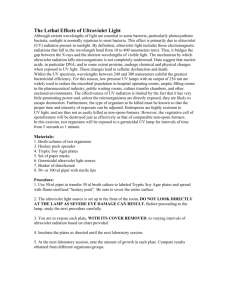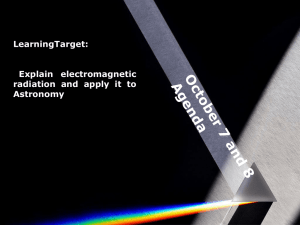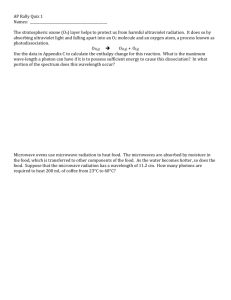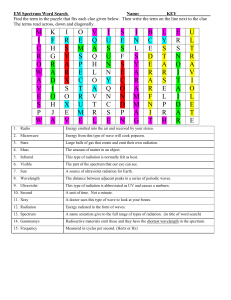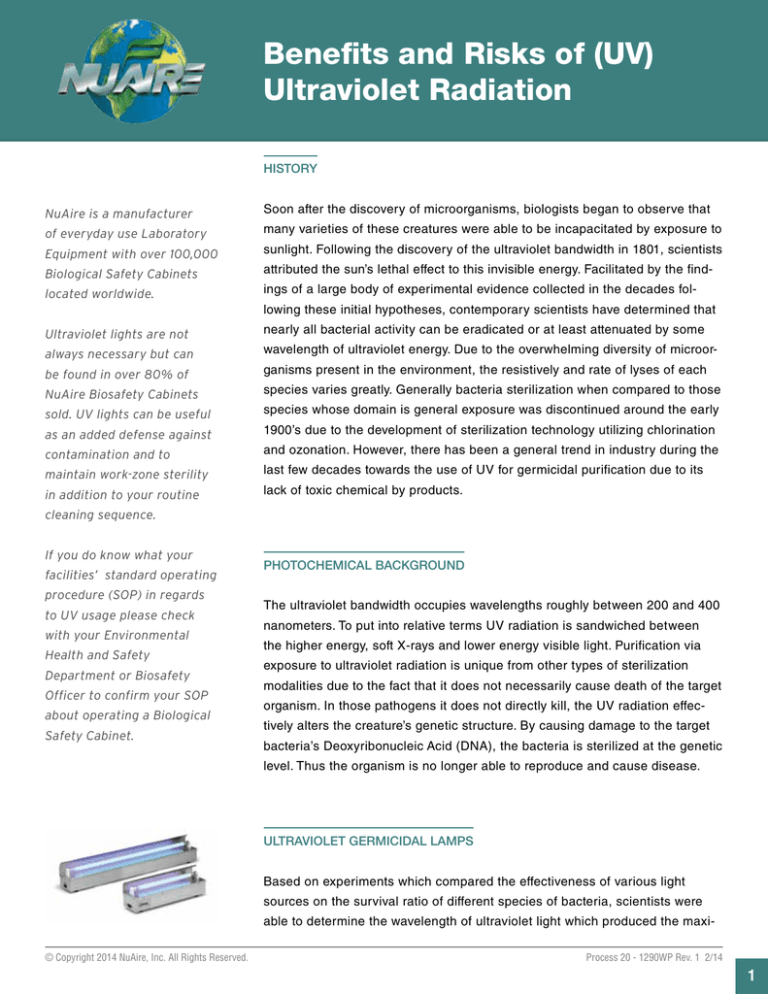
Benefits and Risks of (UV)
Ultraviolet Radiation
History
NuAire is a manufacturer
Soon after the discovery of microorganisms, biologists began to observe that
of everyday use Laboratory
many varieties of these creatures were able to be incapacitated by exposure to
Equipment with over 100,000
sunlight. Following the discovery of the ultraviolet bandwidth in 1801, scientists
Biological Safety Cabinets
attributed the sun’s lethal effect to this invisible energy. Facilitated by the find-
located worldwide.
ings of a large body of experimental evidence collected in the decades following these initial hypotheses, contemporary scientists have determined that
Ultraviolet lights are not
nearly all bacterial activity can be eradicated or at least attenuated by some
always necessary but can
wavelength of ultraviolet energy. Due to the overwhelming diversity of microor-
be found in over 80% of
ganisms present in the environment, the resistively and rate of lyses of each
NuAire Biosafety Cabinets
species varies greatly. Generally bacteria sterilization when compared to those
sold. UV lights can be useful
species whose domain is general exposure was discontinued around the early
as an added defense against
1900’s due to the development of sterilization technology utilizing chlorination
contamination and to
and ozonation. However, there has been a general trend in industry during the
maintain work-zone sterility
last few decades towards the use of UV for germicidal purification due to its
in addition to your routine
lack of toxic chemical by products.
cleaning sequence.
If you do know what your
facilities’ standard operating
procedure (SOP) in regards
to UV usage please check
with your Environmental
Health and Safety
Department or Biosafety
Officer to confirm your SOP
about operating a Biological
Safety Cabinet.
Photochemical Background
The ultraviolet bandwidth occupies wavelengths roughly between 200 and 400
nanometers. To put into relative terms UV radiation is sandwiched between
the higher energy, soft X-rays and lower energy visible light. Purification via
exposure to ultraviolet radiation is unique from other types of sterilization
modalities due to the fact that it does not necessarily cause death of the target
organism. In those pathogens it does not directly kill, the UV radiation effectively alters the creature’s genetic structure. By causing damage to the target
bacteria’s Deoxyribonucleic Acid (DNA), the bacteria is sterilized at the genetic
level. Thus the organism is no longer able to reproduce and cause disease.
Ultraviolet Germicidal Lamps
Based on experiments which compared the effectiveness of various light
sources on the survival ratio of different species of bacteria, scientists were
able to determine the wavelength of ultraviolet light which produced the maxi© Copyright 2014 NuAire, Inc. All Rights Reserved.
Process 20 - 1290WP Rev. 1 2/14
1
“Due to the short time for
mal germicidal effectiveness. This wavelength was determined to be 253.7 nm.
UV overexposure to occur, it
This finding explained why sunlight is only marginally effective in the treatment
is recommended that neither
of pathogens. This wavelength is far beyond the short-wave limit of solar light.
laboratory nor maintenance
personnel work in a room
where UV lights are on. The
CDC, NIH, and NSF agree
that UV lamps are neither
recommended nor required
in Biological Safety
Cabinets (BSC).”
Applied Biosafety. “Position Paper
on the Use of Ultraviolet Lights in
Biological Safety Cabinets”
Applying UV Sterilization to Industry
Sterilization through the utilization of ultraviolet radiation has experienced
an upsurgence of popularity in the last decade. Industry has embraced this
technology due to its convenience, safety, and relative cost effectiveness. The
following specific application areas are:
• Sterilization within the Food Industry
• UV Water Purification Systems
• Sterilization of Air
Jyl Burgener, Eli Lilly and Company
The Use of Ultraviolet Lights in Biological Safety Cabinets
The use of ultraviolet (UV) lights in biological safety cabinets (BSCs) has
enjoyed a long history. The current version of the NSF International Standard
49 dismisses the use of UV in a BSC. The CDC and NIH, in their joint pamphlet “Primary Containment for Biohazards: Selection, Installation and Use of
Biological Safety Cabinets, 2nd Ed.” have taken a similar stand.
ABSA [American Biological Safety Association] has, to date, made no official
pronouncement. Researchers continue to request their cabinets be outfitted
with the lights and all manufacturers offer them as an option. Currently 80%
- 90% of all United States Class II Type A2 Biological Safety Cabinets manufactured within the last 15 years are being shipped with Ultraviolet Germicidal
Lights installed.
Objections
Several issues arise with the use of ultraviolet radiation in a biological safety
cabinet. It has been argued that UV radiation puts researchers at risk from
ocular damage and cancer. The UV radiation generates ozone that can damage materials within the cabinet, the radiation is ineffective at high humidity
levels, the blue lamp remains the same constant blue even though the effective radiation has ceased to exist, UV radiation only kills surface bacteria, UV
radiation gives the researcher a false sense of security, and the UV bulb must
be cleaned weekly to prevent a drop in output.
© Copyright 2014 NuAire, Inc. All Rights Reserved.
Process 20 - 1290WP Rev. 1 2/14
2
NuAire is working with
the IFBA (International
Even though the vast majority of our UV-equipped cabinets were using the
Federation of Biosafety
effects of the radiation to assist with disinfecting their cabinets, users of these
Associations) to help
BSC’s are also using chemical disinfectants [Isopropanol being the most com-
promote biosafety and
mon disinfectant in tissue culture areas]. Therefore, it has been argued that
biosecurity throughout
UV radiation is not necessary if the BSC is being properly disinfected using
the world. Learn more by
good aseptic techniques.
visiting:
www.nuaire.com/ifba
Precautions
• An individual should not expose themselves to UV radiation. Be sure the
BSC is not being used with the UV light on. Most BSC’s have the fluorescent light interlocked with the UV light switch with the window in the
closed position for the UV light to be on.
• Wipe clean the UV lamp at least once every week or two.
• Check periodically with a UV meter to ensure the effectiveness of the
radiation.
• When disposing of a spent UV lamp, dispose of it as hazardous waste.
• Beware the ozone emitted from the radiation can cause plastics/rubber to
deteriorate.
• UV radiation should not take the place of wiping down the cabinet interior
with a disinfectant.
References
Luckiesh, M, Holladay, L. L., Taylor, A. H., “Sterilization through Utilization of Ultraviolet Radiation”,
Solar Light Co. 1999
For more information on
NuAire products and/or
technical papers please visit
www.nuaire.com
Meechan, P. J., Wilson, C., “Use of Ultraviolet Lights in Biological Safety Cabinets: A Contrarian
View”, Applied Biosafety, 11[4] pp., 222-227 @ ABSA 2006
University of Minnesota, Environmental Health and Safety, “UV Lights” June 14, 2010
Burgener, Jyl., “Position Paper on the Use of Ultraviolet Lights in Biological Safety Cabinets”, Applied Biosafety, 11[4] pp., 228-230 @ ABSA 2006
NuAire and the NuAire logo are either registered trademarks or trademarks of NuAire Incorporated in the United States and/or other
countries. All other trademarks are the property of their respective owners.
NuAire, Inc.
2100 Fernbrook Lane
Plymouth, MN 55447-4722
USA
www.nuaire.com
© Copyright 2014 NuAire, Inc. All Rights Reserved.
Process 20 - 1290WP Rev. 1 2/14
3

